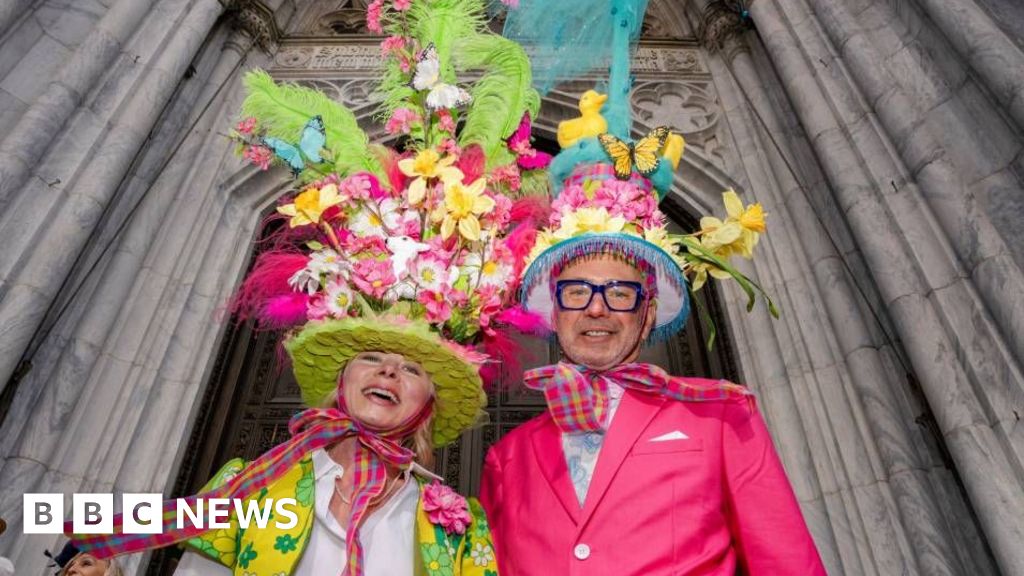Christians around the world are celebrating Easter. All Christians, from Orthodox and Western churches, are observing the holiday on the same day this year - not often the case because the churches use different calendars. In Greece, the sky lit up with fireworks, while worshippers in Jerusalem lit candles at the church where Jesus is said to have been crucified and buried. Christians believe Jesus rose from the dead, which is remembered at Easter. Here is a look at how some have been celebrating the holiday as days of festivities culminate in Easter Sunday.
In pictures: Easter celebrated around the world from Greece to Iraq
TruthLens AI Suggested Headline:
"Global Easter Celebrations Unite Christians Across Traditions"
TruthLens AI Summary
Easter celebrations are taking place worldwide as Christians from both Orthodox and Western traditions observe the holiday on the same day this year. This alignment is notable, as it does not occur frequently due to the differing calendars used by the two branches of Christianity. In Greece, vibrant fireworks illuminated the night sky, symbolizing the joy and festivity associated with the resurrection of Jesus Christ, an event that is central to the Easter celebration. Meanwhile, in Jerusalem, worshippers gathered at the Church of the Holy Sepulchre, a site believed to be where Jesus was crucified and buried. Here, they lit candles as a sign of reverence and remembrance, embodying the spiritual significance of Easter for Christians around the globe.
As Easter Sunday marks the culmination of a series of celebratory days, communities are engaging in various traditions and rituals that highlight the importance of this occasion. The belief in the resurrection of Jesus is a unifying theme for all Christians, and it serves as a foundation for the joyous observance of Easter. Across different cultures and regions, people participate in unique customs that reflect their heritage while embracing the core message of hope and renewal that Easter represents. From communal feasts to solemn church services, the diverse ways in which Easter is celebrated underscore its importance as a time of reflection, gratitude, and joy among Christians worldwide.
TruthLens AI Analysis
The celebration of Easter among Christians worldwide, as described in the article, highlights a moment of unity among different denominations that typically follow varying calendars. The vivid imagery of celebrations from Greece to Iraq paints a picture of cultural and religious diversity, while also illustrating the shared belief in the resurrection of Jesus Christ. This narrative seeks to foster a sense of global community and shared values during a significant religious observance.
Purpose Behind the Publication
This article aims to inform readers about the simultaneous celebration of Easter among various Christian denominations, which is a relatively rare occurrence. By showcasing diverse traditions, the piece promotes interfaith understanding and highlights the importance of shared beliefs in a world often marked by division.
Public Sentiment and Perception
The focus on celebration and unity may evoke feelings of joy and togetherness among readers. This approach is likely intended to create a positive sentiment around the Easter holiday, reinforcing the idea that despite differences in practices, there is a common thread of faith that binds Christians together.
Potential Omissions
While the article provides a celebratory overview, it may downplay the complexities and challenges faced by Christian communities in certain regions, particularly in areas where religious tensions exist. This could lead to a somewhat sanitized portrayal of the realities many Christians face, particularly in conflict zones.
Trustworthiness of the Information
The information appears to be grounded in factual description of events surrounding Easter celebrations, making it largely reliable. However, the selective focus on joyous celebrations may indicate a desire to present an idealized view of the holiday, which could be seen as manipulating the narrative.
Societal Implications
This article has the potential to foster increased interfaith dialogue and understanding, especially in multicultural societies. By emphasizing unity, it may encourage cooperation among different religious groups, ultimately contributing to social cohesion.
Target Audience
The article primarily appeals to Christian communities, particularly those interested in the cultural and religious significance of Easter. Additionally, it may attract a broader audience interested in global cultural practices and religious celebrations.
Economic and Market Impact
While the article may not directly influence financial markets, it could indirectly affect sectors related to tourism, hospitality, and retail, particularly in areas heavily visited during religious holidays. Increased travel and spending during Easter could benefit local economies, particularly in regions known for their celebrations.
Geopolitical Context
The celebration of Easter in diverse regions can reflect broader societal trends and issues, such as religious freedom and cultural identity. While the article does not delve into these aspects, the context of Easter celebrations in areas like Iraq could indicate the resilience of faith communities amidst adversity.
Artificial Intelligence Influence
While it is unclear if AI was used in crafting this article, the structured presentation and neutral tone suggest a possible influence of AI models in summarizing data or organizing information. The focus on celebratory aspects might reflect an algorithmic preference for positive narratives.
Manipulative Elements
The article may contain subtle manipulative elements through its selective focus on unity and celebration, potentially glossing over underlying tensions in certain regions. This choice of language and emphasis could be seen as an attempt to promote a specific narrative of peace and cohesion.
In conclusion, the article presents a largely accurate portrayal of Easter celebrations while promoting a positive and unifying narrative. However, it may omit some of the complexities faced by Christians in various regions. Overall, it serves its purpose of celebrating a significant religious event and fostering a sense of global community.
